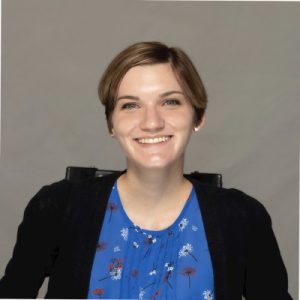
Biostatistician. Mathematician. Musician. North Carolinian.
Lane is a recent PhD graduate of the Rollins School of Public Health at Emory University. She holds a BSPH in biostatistics, BA in mathematics, and music minor from UNC Chapel Hill. Her dissertation research focuses on statistical methods for cell-type-specific mediation analysis of DNA methylation data. Lane is passionate about statistics research with public health applications and incorporating diversity, equity, and inclusion principles in data science education.
Q: Tell us a bit about yourself:
A: I was born and raised in Greensboro, North Carolina and my family is still there. I decided to stay pretty close for undergrad and went to UNC and had a great experience. I really liked it and was very fortunate they had an undergrad biostats program.
I was originally a math major, but when I heard about biostats, I felt like it was a good way to kind of mix math with a way to make an impact on society as a whole. I got involved with some undergraduate research with a computational biology professor and PhD student. The professor was a good mentor and encouraged me to pursue a PhD, I thought, why not?
Academic life just appealed to me. It’s very flexible in terms of personal life, but also in terms of your creative endeavors. I knew I wanted to pursue an academic career, so that was a major motivator for pursuing the PhD. I explored other areas and talked to people in different sectors, but I think I was always kind of leaning toward an academic career.
Q: How important was it for you to make a difference?
A: I didn’t want to do something just for the sake of doing it. I wanted to do something for a larger purpose, so I wanted to learn data skills since more and more policy decisions are being based on such data. People need to be able to go through the data and make really good decisions based on the information. That’s something I wanted to be a part of.
The public health sector, in particular, was appealing to me since I have a physical disability, which is obviously a big factor in my life, and influences a lot of my decisions.
Q: How did you choose where to pursue your PhD?
A: It came down to staying at UNC or going to Emory. I just really liked my visit at Emory and thought it would be a good life experience to move out of North Carolina for a little bit. Even though six hours away doesn’t sound like a lot, for someone like me, having a disability, it was a big move for me. But I felt really good about the department there and confident that I would be supported. There was a really great atmosphere, very welcoming and collegial, which appealed to me as a researcher.
Q: Can you tell us about your research?
A: You know, the main appeal for me was maybe less on the technical side and more on the availability of data and the impact you can have being involved in decisions that are made, based on that data. A good example is a project I worked on that had to do with pediatric heart transplants. The actual modeling and stats side of it was not very complex. I was able to just explore the numbers and look at it from different angles, but it still can have a huge impact on the future of that field. So that project was pretty impactful for me.
Q: What MIDS course will you be teaching in the fall?
A: I’ll be teaching IDS 702, “Modeling and Representation of Data.” Students will learn the general workflow for building statistical models and using them to answer inferential questions.
Q: Any advice for incoming MIDS students regarding your course?
A: Courses about getting to know data (like exploratory data analysis) would be really helpful. It’s always a big first step before you get to modeling to just be able to kind of get your feet wet and know what to do when you’re given a data set. If you get data from a client or collaborator it’s probably not going to be perfect, so you need to know what to look for. It’s important to ask the client good questions to understand the context and research question.
Q: Why MIDS?
A: I’m incredibly excited about this program, and really think it’s the best fit that I could have found. My mentors at Emory were also excited about this opportunity for me to join MIDS and thought the program and position was perfect.
The big thing for me was a balanced teaching load. I really enjoy teaching, but I didn’t want to go into position where I was teaching six-eight courses a year. I also want to focus on enhancing the quality of my teaching and becoming a better instructor.
Data science appeals to me because as much as I like public health applications, I want to be more broad in my experience. Data science, as opposed to statistics, is more about the future: how do we handle all of this big data, what are these innovative techniques, and how can we make data literacy more accessible to a broad range of people?
Q: What do you like to do in your free time?
A: I like to read, play board games, and I watch a lot of sports (basketball, football, and baseball). I’m a big extrovert so I love getting together with friends and family. I’m also involved in some disability advocacy work.
Learn more:
Github
Twitter
LinkedIn
Google Scholar
